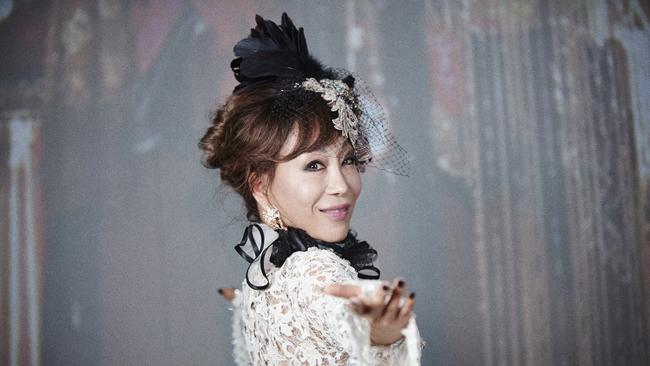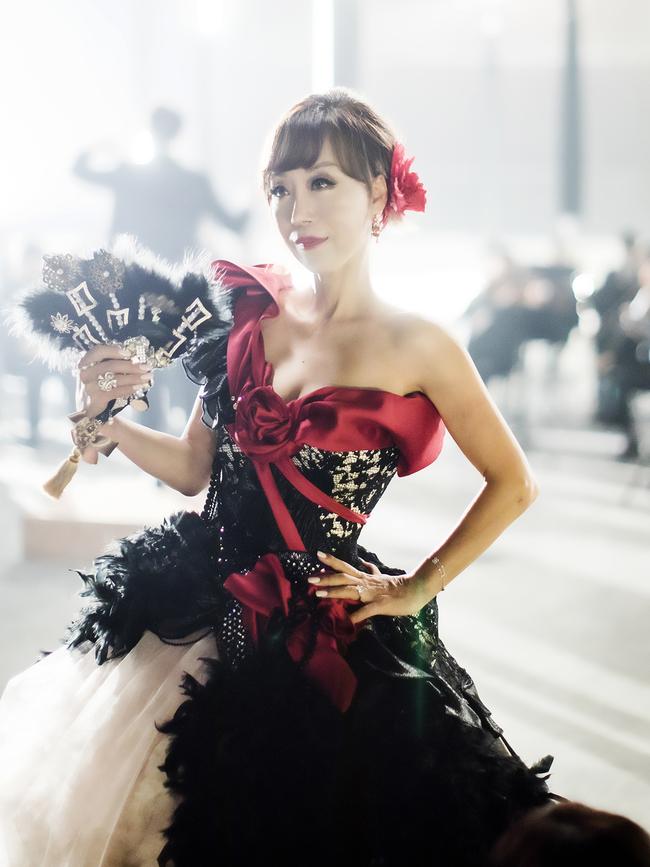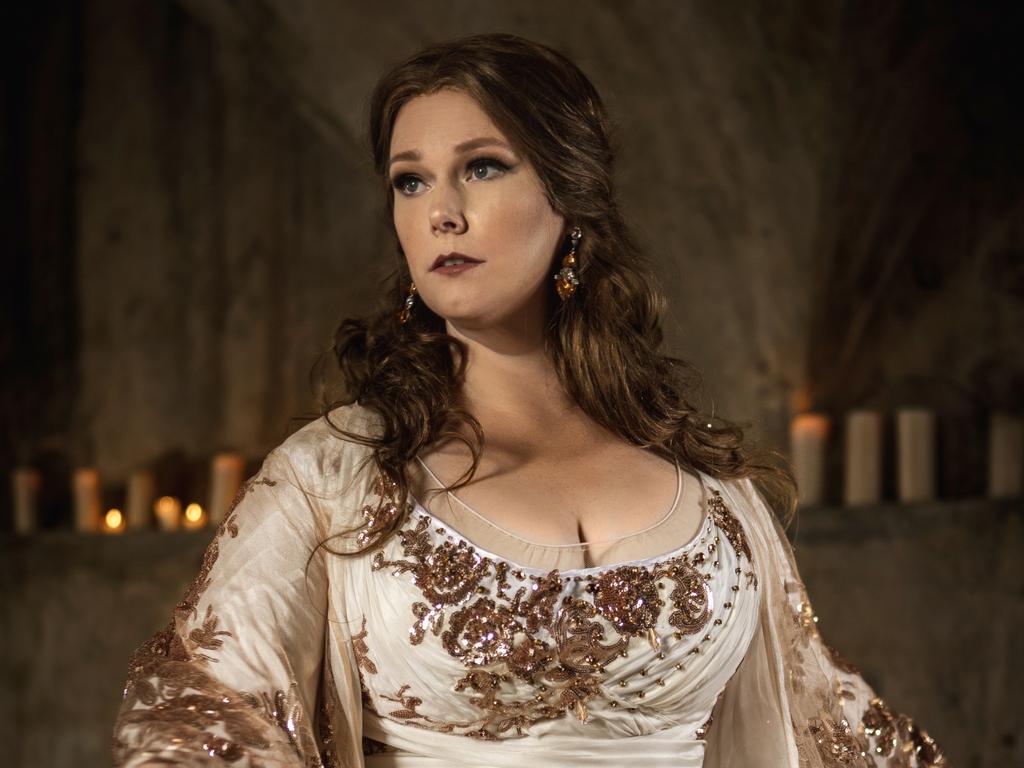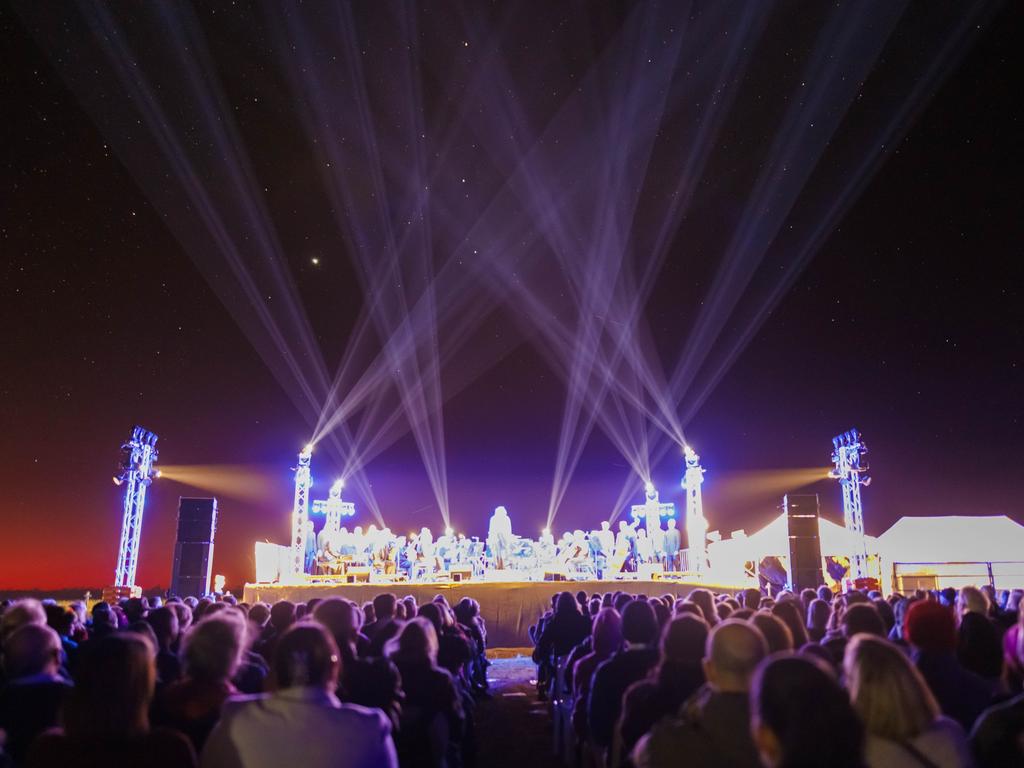Grammy Award-winning soprano Sumi Jo heads to the outback
Opera superstar Sumi Jo reflects on the highs and lows of her globetrotting career as she heads to Queensland’s outback.

La Scala, the Metropolitan Opera, Covent Garden, Vienna State Opera … Winton and Longreach.
Grammy Award-winning diva Sumi Jo has performed in the world’s most hallowed opera houses and worked alongside legendary conductors and singers including Herbert von Karajan, Sir Georg Solti, Placido Domingo, Renee Fleming and Angela Gheorghiu. Jo has starred in outdoor spectacles ranging from the Beijing Olympics to a stadium concert staged for Pope Francis in her homeland, South Korea.
With a penchant for ball gowns that wouldn’t look out of place in a Gone with the Wind remake, and hailed by von Karajan as “a voice from above”, the coloratura soprano has now signed up for an Australian gig few would have predicted: This month she will join Opera Queensland’s Festival of Outback Opera, performing in the tiny towns Winton and Longreach, notable for their cattle stations, vast skies and dinosaur remains rather than any five-star hotels or gilt auditoriums.
So why has Jo agreed to sing under the stars 700km west of Rockhampton? Speaking from her home in Lisbon, the 62-year-old diva tells Review she saw footage of the annual outback festival and “I thought it was a beautiful event … the natural heritage of the outback is so beautiful and you can feel a sense of community there. So I have thought that maybe, ‘Wow, that would be nice to perform there, because I love open-air concerts’.’’ Jo will perform in two concerts in this recently flood-hit region: the first, Dark Sky Serenade, will unfold atop a 75-metre high rock platform at the Australian Age of Dinosaurs Museum near Winton. She will star in a second concert at the cattle property Camden Park Station, which was visited by Queen Elizabeth II in 1970.
Although securing South Korea’s most celebrated classical artist is a casting coup, Opera Queensland CEO and artistic director Patrick Nolan says the process was “surprisingly straightforward’’. He showed her agent footage and photos from past outback opera festivals, stressing that other singers with international profiles – Kang Wang, Emma Matthews, Teddy Tahu Rhodes, Rachelle Dirkin – had taken part.
To seal the deal, Nolan flew to Seoul this year to meet the singer and watch her perform – and what he saw surprised him. He says: “While I knew I was going to encounter one of the great bel canto singers of our time, I hadn’t reckoned on how down to earth she would be. She had the audience in the palm of her hand, at one point taking the baton of the maestro and conducting both the orchestra and us in a singalong. I think the festival audience will love her and she will feel right at home with them.’’
The Festival of Outback Opera features pub singalongs, a female conductor in Vanessa Scammell, a cast of young singers and an orchestra drawn from the Queensland Symphony Orchestra and the University of Queensland’s Pulse Chamber Orchestra. All of which appealed to Jo. “I love working with young singers,’’ says the opera star, whose Sumi Jo International Singing Competition will be held for a second time in France in 2026.
One of the world’s top-selling classical and crossover artists, Jo says her outback performances will include French and Italian arias, excerpts from The Merry Widow and Bernstein songs. It will, she says, resemble “a journey through music in beautiful surroundings’’.
Known for her vast classical repertoire and genre-hopping experiments, Jo has performed with American saxophonist Kenny G and released albums ranging from opera classics to Korean love poems and Broadway songs. In 2016, she was nominated for an Academy Award for best original song, earning this nod for her emotive interpretation of the David Lang track Simple Song #3 in the film Youth, about a retired film conductor who is asked to perform for the royal family.
In the days before we speak, Jo has been travelling between Singapore, Vienna and Lisbon, conducting masterclasses and working on a “secret” forthcoming album. The album will be released in 2026 – which marks the 40th anniversary of her international opera debut.
“This year is sort of preparing for next year’s celebration,’’ she says, revealing her anniversary schedule is likely to involve further Australian appearances. “My activities don’t belong only to Europe where I’m living, but I’m covering almost all of the world.’’
This looming milestone seems to put Jo in a reflective and candid frame of mind about the sacrifices she has made for her stellar and history-making career.
In a previous interview, she made the startling admission that if she were to live her life again, she wouldn’t be an opera singer.
When asked about this, she explains: “I gave everything, every day and every country, every opera house, every concert hall, I used to be like a perfectionist. That was my top priority, to be a wonderful performer, great artist. But to be able to do it like that requires, as you can well imagine, many sacrifices and loneliness.’’

She says she has spent decades touring and adhering to an almost ascetic routine: “(You are) always far from your family members, and then you have only time for the performances. You have to practice, exercise and so you rarely go out with friends. You don’t drink, you don’t smoke, you come back right after the program because you have to travel or you have other performances. So it’s a very strict, very disciplined lifestyle … You should not be sick, you are to be always perfect.’’
Jo adds that opera singers also need to be strong psychologically. “Singing is not like when you push the button and you can sing like a bird. No. When you have a sad moment and (are) frustrated, you close your throat, you want to cry. And so you constantly try to be positive and happy to be able to sing. ‘’
One sacrifice she will never forget was missing her father’s funeral in 2006 so she could honour a singing engagement in Paris. “The day before I heard that my father died in Korea. But I didn’t cancel … My mother told me, ‘Don’t come back to Korea to the funeral of my father’.’’ Instead, her mother urged her to do her concert and dedicate it to her dad – so that is what she did. Footage of that concert shows her singing Ava Maria while her grief was still raw, and weeping at the end of her performance as she embraced her accompanist.
She says of her mother, who passed away during the Covid pandemic: “I think she’s so strong, I don’t know how you can say to your daughter that your father died and then you say, ‘No, stay there in Paris … and dedicate that concert to your father and he will be happy’ … I think I took everything from my mum, who was such a strong and responsible person.’’
Jo’s mother was an amateur singer who missed out on a professional career because of political instability in Korea. She was determined her daughter would succeed, so Jo was signed up for music lessons from the age of four and singing lessons from the age of six. She was expected to practice for up to eight hours a day.
The singer tells Review she was often “quite lonely and frustrated’’ during her childhood. “My mother was very, very hard towards her kids and I was the target. She had made a decision already about what I was supposed to do.’’
Despite her openness about the drawbacks of her career, Jo also sees it as “a destiny. My mother pushed me in this direction. You are my daughter but most of all you are a performer … So voila! I became exactly like she wanted.” She also acknowledges that at “the end of the day, my life is music. I cannot survive (without it) ... When you are on stage and you are born again, every time it’s like an amazing experience.’’
She says she intends to continue performing for as long as “God gives me the chances’’ and chides herself for the above remarks. “I’m complaining to you, I’m just like a little child, ‘Oh my God, this was so difficult, blah, blah blah ...’ ”
Jo’s extraordinary talent was evident from an early age. In 1981 she was accepted into Seoul National University’s vocal music program with the highest practical score recorded to that date. While still a student, she made her professional opera debut as Susanna in The Marriage of Figaro in a Seoul opera production.
In 1983, she left Korea to study keyboard and singing at the National Academy of Saint Cecilia in Rome, one of the world’s oldest music colleges.
“I went to Italy all by myself, without money,’’ she recalls. “And then, you know, doing the field of opera and no Asian singer was able to really perform at the European major opera houses – so it was a big challenge.’’
Three years later, she made her European operatic debut as the tragic, love-struck teenager Gilda in Verdi’s Rigoletto. This performance caught the attention of von Karajan, who subsequently auditioned her and cast her in a production of A Masked Ball opposite Placido Domingo.
To say Jo’s meeting with von Karajan – who presided over the Berlin Philharmonic for 35 years – was fortuitous is an understatement. “All of a sudden, my destiny has completely changed,’’ she says. “I had very important recording deals, recording contracts. I started to perform all over the world as the first Korean soprano.’’
Before she turned 30, this pint-sized trailblazer had made her debut with prestigious companies including the Royal Opera, Paris Opera and the Metropolitan Opera. “I’m so proud of that,’’ she says, “and then time flies and next year I celebrate 40 years, so it’s amazing.’’
Was von Karajan as scary as people say? “Not to me because I grew up talking to him,’’ she says. She had a poster of him conducting, eyes jammed shut, on her bedroom wall while she was growing up in Korea. “In the morning I wake up, I say, ‘Maestro, good morning.’ Before I go to bed I say ‘Good night, Maestro,’” she says, chuckling softly.
So when his secretary called her in the 1980s, “I was very, very comfortable. It’s like I’m meeting a neighbour or even family member.’’ After she auditioned for the famously intimidating conductor in Salzburg, “he immediately asked me, ‘Do you want to do A Masked Ball with me next year with Placido Domingo? I said, ‘Of course’. I didn’t know what he was talking about – I didn’t know which opera (that was).’’ She lets out a high, piping laugh, again insisting “it was a destiny to meet him’’. (While Jo recorded a 1989 album with the maestro, he died later that year during A Masked Ball’s rehearsal period.)
Another superstar she encountered early in her musical journey was La Stupenda – Joan Sutherland. She recalls that “when I was very little, like 12, 13 years old, I was imitating so perfectly all the cadenzas that maestro Richard Bonynge (Sutherland’s husband) wrote for her. I was like a perfect ...”
Mini-Joan? “Exactly. And then my first solo album called Carnaval! (1994) was prepared by Richard Bonynge. Right after this release of my first solo album, I was invited to their home in Switzerland. Joan cooked for me a dinner, a very special dinner. And I gave to her this brand new album and she said, ‘No, it’s not necessary. I have already three’.’’
Sutherland joked she was “a little bit jealous” that Bonynge had given Jo “all these very, very rare” French coloratura arias. “It was a very, very warm and intimate dinner.’’
Jo has almost 50 albums to her name, including Only Love (2000), an anthology of musicals numbers that sold more than one million copies in South Korea. Her next album, to be released by Warner Classics, will take her into uncharted territory.
“I’m going to prepare something quite unique and nobody did it before – music with AI,’’ she tells Review, adding that “it’s sort of secret. I don’t know why I’m telling you this. Nobody (has) tried it before’’.
While many artists see AI as a threat to their livelihoods, Jo believes the technology could help classical music endure. She says the new album may feature a duet in which she sings one part with her natural voice, while another part is an AI version of her voice.
In 2014, the diva sang for Pope Francis in Korea at a packed football stadium. Despite her track record of conquering stages across the world, she was “very, very nervous”. The night before, she couldn’t sleep so “at three in the middle of night I was practising in my bathroom. All of a sudden, the hotel manager called me up and said, ‘Oh, please, Ms Jo, be quiet, because there are so many complaining calls’ … First time in my life I had a complaining call,’’ she says, chuckling, and revealing that she met the Pontiff after she performed.
Jo is a French opera and bel canto specialist, renowned for the astounding agility, crystalline clarity and warmth of her voice. Her interpretations of Mozart’s technically tricky Queen of the Night aria are also widely celebrated. She has been nominated for three Grammy Awards and in 1992, she won a Grammy after she sang on the Vienna Philharmonic’s recording of Strauss’s The Woman Without A Shadow, under the baton of Solti.
Asked about her favourite roles, she mentions Gilda from Rigoletto and Lucia from Lucia di Lammermoor, who is forced into a loveless marriage and turns murderous and mad: “All those moments I enjoy a lot because somehow I’m a quite positive and very sunshiny person. But on stage I love facing these difficult characters and personalities.’’
Even so, she reveals that she finds singing in opera venues without a microphone emotionally exposing: “It’s like you are naked on the stage and people can feel it, not only your voice, but what kind of person you are, because you are so transparent … Those things I found quite challenging and difficult … Just imagine that you live like that for 39 years,’’ she says. “It’s a huge thing.’’
However, when it comes to lighter roles and concerts, she says connecting with an audience is like flirting. She likens such performances to “having a date … After 2½ hours of my concerts I want that everybody falls in love with me, and then go back home with that kind of love. I want to be loved, not only for my talents, my voice, but something precious that I share with them (the audience).
“So always I flirt, through music, through my dresses, through my funny comments.
“I do everything. I do practically everything to make them happy and to be loved by them.’’
The diva with the knack for reinventing herself admits “I have very little patience, but I’m doing better now. I’m more like a nice and kind person. Not just towards people – but also to myself.’’
As an older singer, “my mission is to be useful to the young artists, musically and socially’’ – hence the singing competition set up in her name.
She also supports disabled children, animal rights and has been a UNESCO artist for peace. Happily single, and a former kickboxing hobbyist, her favourite past-time is going to the movies. “I know there is Netflix, there are many things you can see at home, but, you know, go to the cinema, feel the big screen. I love that a lot.”
She currently calls Portugal home. In a reflection of just how her peripatetic her life as a globetrotting opera star has been, she says “when people ask me, ‘Where is your home?’ I say, my home is where my heart beats.’’
Opera Queensland’s Festival of Outback Opera runs from May 13 to 19.






To join the conversation, please log in. Don't have an account? Register
Join the conversation, you are commenting as Logout